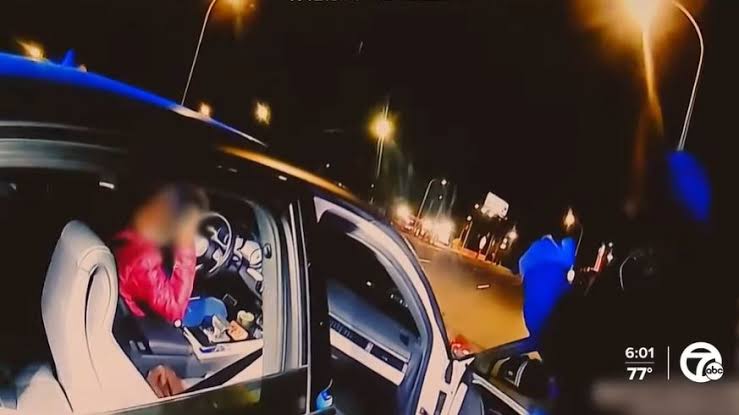Detroit police look into why Lions WR Jameson Williams wasn’t arrested after a gun was discovered in his vehicle.
Two weeks prior to his suspension for violating the NFL’s performance-enhancing drug policy, Detroit Lions wide receiver Jameson Williams was nearly taken into custody by Detroit police over a firearm discovered in a vehicle.
Following inquiries from 7 News Detroit, the police department has initiated an investigation to understand why Williams was released after officers intended to arrest him.
The incident occurred shortly after midnight on October 8, when police stopped a vehicle being driven by Williams’ brother at the intersection of Connor and Jefferson Avenue for speeding. During the traffic stop, the officer asked Williams’ brother if there were any weapons in the car.
The brother informed the officer that there were two guns: one located in the back seat and another under Williams’ seat.
The officer determined that the gun in the back seat was registered to Williams’ brother, who held a concealed pistol license (CPL).
However, the gun beneath Williams’ seat was registered to him, but he did not have a CPL.
Recognizing this as a violation, the officer informed Williams that he would be taken into custody for carrying a concealed weapon.
As seen in body camera footage, the officer appeared unaware of Williams’ identity, despite the wide receiver repeatedly asserting, “I play for the Lions, bro.
I’m Jameson Williams.” The officer maintained that Williams’ status as a player would not influence the arrest decision.
At one point, Williams’ brother claimed ownership of the gun, but Williams later admitted that it was his, stating, “I got the gun for protection. Do you guys know where I live at? Detroit!”
Williams was subsequently handcuffed and placed in the back of a police car.
In an interview, Detroit Police Commander Michael McGinnis affirmed that there was probable cause for the arrest and that Williams should have been transported to the Detroit Detention Center for processing.
affirmed that there was probable cause for the arrest and that Williams should have been transported to the Detroit Detention Center for processing.
However, rather than taking Williams to jail, officers called a supervisor to the scene.
This procedure, according to the department, is standard for high-profile stops to ensure adherence to policy and to manage potential media interest.
A sergeant arrived shortly thereafter and, unlike the initial officers, recognized Williams’ name as a Lions player, as evidenced by his phone wallpaper featuring the Lions logo.
For the next 30 minutes, the sergeant made multiple phone calls to higher-ranking officials to assess whether Williams needed to be arrested or if the CPL held by the driver could cover both weapons.
At one point, the sergeant was heard saying to the arresting officers, “I’m so mad at you two,” which Commander McGinnis interpreted as a light-hearted comment.
After consulting with several supervisors, the sergeant seemed poised to take Williams into custody.
He communicated, “Be advised, he’s coming in. You might want to make special accommodations,” referring to the potential arrest for carrying a concealed weapon.
However, just moments later, the sergeant spoke to a lieutenant who advised against arresting Williams, leading to his release.
The lieutenant’s side of the conversation was not recorded, but the sergeant’s reaction was, “Okay. Beautiful. I’m good to let him go? You’re a (expletive) hero. Thank you so much.”
As a result, Williams was uncuffed, his firearm was returned, no police report was filed, and no warrant request was submitted.
Prompted by questions from 7 News Detroit, the police department opened an internal affairs investigation into the stop and the decision not to arrest Williams.
Commander McGinnis noted that Police Chief James White was dissatisfied with the circumstances surrounding the incident, expressing strong displeasure about how it was handled.
The Detroit Police Department has since submitted a warrant request to the Wayne County Prosecutor’s Office, with Williams facing charges for carrying a concealed weapon in a motor vehicle.
McGinnis raised concerns about whether Williams’ status as a Lions player influenced the decision-making process during the stop.
Earlier, a deputy chief stated that only one gun was found in the vehicle, neglecting to mention the second weapon beneath Williams’ seat.
Once Chief White became aware of the second gun, he authorized the release of parts of the body camera footage to clarify the situation and ordered the internal investigation.
Detroit police officials stand by the actions of the arresting officers, asserting that they acted appropriately during the encounter. The Wayne County Prosecutor’s Office is currently reviewing the warrant request.
Williams’ attorney, Todd Flood, issued a statement to 7 News Detroit, explaining that on October 8, his clients were pulled over for an alleged traffic violation.
He emphasized that both Williams and his brother were cooperative and respectful with the officers throughout the stop. Flood noted that both firearms were registered correctly and that the driver had the necessary credentials to carry them.
As the investigation unfolds, the incident raises significant questions about the implications of being a high-profile athlete in legal situations and how police procedures may be influenced by a suspect’s public persona.
The ongoing scrutiny by both the media and the public underscores the importance of accountability and transparency within law enforcement, especially in cases involving potential biases.
Ultimately, this incident serves as a reminder of the complexities involved when celebrities come into contact with law enforcement.
It highlights the necessity for police to adhere strictly to their protocols, irrespective of an individual’s public status, to maintain integrity and public trust. The results of the internal investigation may not only affect Williams but also influence future interactions between law enforcement and high-profile figures.
In summary, the Detroit police investigation into the circumstances of Jameson Williams’ near arrest reflects broader issues of accountability in law enforcement, particularly concerning how public perception can affect decision-making processes.
As the case progresses, it will be crucial to examine the findings of the internal investigation and how they may lead to changes in policy or procedure to ensure fair treatment for all individuals, regardless of their public stature.




